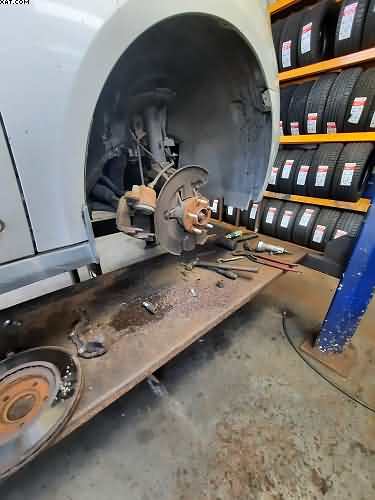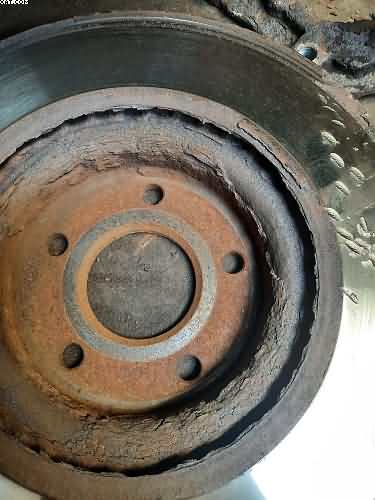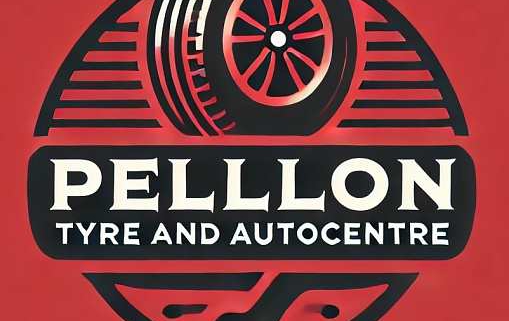Ford Transit Connect Corroded Discs
Table of Contents
Ford Transit Connect Corroded Discs

Ford Transit Connect Corroded Discs
How Corroded Brake Discs Can Cause Brake Fluctuations (And Other Unexpected Surprises!)
When a Ford Transit Connect pulled into my garage (Pellon Autocentre in Halifax, UK) on a nice sunny day, we noticed immediately that something wasn’t quite right. The motorist complained that the brakes fluctuated strangely and excessively. The brakes seemed to be performing a sort of dance, not a smooth one but rather a jerky, erratic one. Now, if you’ve driven in Halifax or anyplace else in the beautiful, but frequently rainy United Kingdom, you are aware of how annoying corrosion can be, particularly when it comes to your brakes. Inspection revealed the source of the issue to be severely corroded brake discs.
So, What Is the Issue with Brake Disc Corrosion?
Let’s begin with the fundamentals. To put it in technical terms, brake discs—or rotors—are essential for bringing your car to a stop and slow down. The brake pads clamp down on the discs as you depress the brake pedal, creating friction that slows the wheels. If the discs are in good condition, everything goes rather smoothly.
It’s a different story, though, when discs start to corrode—as in the case of this Transit Connect. In essence, corrosion is rust that develops on the discs’ surface, particularly when the car isn’t driven frequently or is exposed to wet, salty roads. Brake discs frequently suffer from this in the UK, where road salt is the preferred wintertime protectant.
How Are Fluctuations Caused by Corrosion? Ford Transit Connect Corroded Discs
Brake disc corrosion results in an uneven surface. The brake pads come into contact with a pitted, rusty surface rather than a flat, smooth disc. When you try to slow down, the brake pads’ grip on this uneven surface causes varying pressure and abrupt movements. It feels like there are frequent grabs and releases on the brakes.
Not only is this variation uncomfortable, but it’s also risky. In an emergency, uneven braking can make it more difficult for you to stop swiftly. Additionally, because the brakes become unpredictable at higher speeds, it becomes more difficult to keep control of the car. When cruising one of the winding back roads that are dotted throughout West Yorkshire, you don’t want your brakes to give out just when you need them most.

Additional Issues The Causes of Corroded Brake Discs
There are other problems with damaged brake discs besides fluctuations. Numerous more issues could arise as well: Ford Transit Connect Corroded Discs
1. Decreased Braking Efficiency: Corroded discs produce significantly less stopping power. Longer stopping distances and less friction are the results of the rust, which essentially serves as a barrier between the brake pads and the disc. It’s not the best option if you have to stop quickly in heavy traffic or if you’re racing through Halifax’s winding streets.
2. Increased Wear on Brake Pads: Brake pads deteriorate far more quickly due to corroded discs. Rust and disc debris, which can act like sandpaper, can cause brake pad erosion. Therefore, in addition to having to replace the discs, you’ll probably need new pads sooner than you think.
3. Brake Noise: Corrupted discs may be the cause of any grinding or screeching noise you’ve ever heard when braking. The loose rust particles and uneven surface make for a terrible racket. Not only is it embarrassing, but it also indicates that your brakes are not doing well.
4. Brake Pedal Vibration: When applying pressure, you may experience a pulsating or vibrating brake pedal in addition to the varying feel. This is just another indication that the discs aren’t in ideal shape. The brake pedal should feel solid and steady, not wobbly, when operating on a smooth surface.
5. Potential Brake Failure: Brake discs may shatter or crack in severe circumstances if the corrosion is severe enough. Although uncommon, this is a concern, particularly if you’ve been putting off the repairs for some time.
How Can It Be Fixed? Ford Transit Connect Corroded Discs
The fix for our Transit Connect was simple: replace the brake discs and pads that had rusted. Discs with severe corrosion are not worth attempting to save; even with minor cleaning, the discs’ structural integrity may already be damaged. You will get the optimum performance and assurance that your brakes are operating properly with new discs.
Here, routine upkeep is essential. Get your brakes inspected if you experience any of the following symptoms: noise, vibrations, fluctuations, or decreased braking effectiveness. It is preferable to detect corrosion early on before it worsens.
Local Knowledge-Ford Transit Connect Corroded Discs
Now, rain and salty roads are nothing new to Halifax drivers, and these are ideal circumstances for brake deterioration. It’s always a good idea to inspect your brakes after a very wet winter or period of heavy rain. You should inspect the discs even more if your automobile or van is left idle for an extended period of time. You can avoid some significant repair costs and the hassle of handling brake variations while driving by paying a little attention now!
Therefore, monitoring your braking discs could make the difference between a comfortable and safe journey and a terrifying one, whether you’re driving a Transit Connect for work or just travelling around town. And believe me, nobody needs further anxiety these days when driving!
- Rover Exhaust Flexi Pipe Fitted
- Vauxhall Zafira MOT Failure
- Michelin Sports Tyres
- Toyota Aygo Test Failure
- Caravan Tyre Problems
